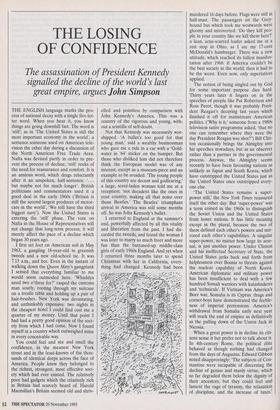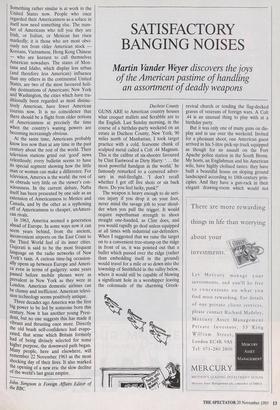THE LOSING OF CONFIDENCE
The assassination of President Kennedy signalled the decline of the world's last great empire, argues John Simpson
THE ENGLISH language marks the pro- cess of national decay with a single five-let- ter word. When you hear it, you know things are going downhill fast. The word is `still'; as in The United States is still the most important economy in the world', a sentence someone used on American tele- vision the other day during a discussion of the North American Free Trade Area. Nafta was devised partly in order to pre- vent the process of decline; 'still' reeks of the need for reassurance and comfort. It is an anxious word, which drags reluctantly after it an unspoken, half-sentence: but maybe not for much longer'. British politicians and commentators used it a good deal in the early 1960s (`Britain is still the second largest producer of motor- cars in the world', 'We still have the third biggest navy'). Now the United States is entering the 'still' phase. The vote on Nafta in the House of Representatives will not change that long-term process; it will merely affect the pace of a decline which began 30 years ago.
I first set foot on American soil in May 1963, a gangling 18-year-old in greenish tweeds and a new old-school tie. It was 7.15 a.m., and hot. Even in the instant of walking down the Queen Mary's gangplank I sensed that everything familiar to me would seem outmoded here. Whaddya need two o'these for?' rasped the customs man sourly, rooting through my suitcase on a trestle table and holding up a pair of hair-brushes. New York was devastating, and unthinkably expensive: two nights in the cheapest hotel I could find cost me a quarter of my money. Until that point I had had a pretty good opinion of the soci- ety from which I had come. Now I found myself in a country which outweighed mine in every conceivable way.
You could feel and see and smell the confidence, in the meanest New York street and in the least-known of the thou- sands of identical dorps across the face of America. People knew they belonged to the richest, strongest, most effective soci- ety which had ever existed. The relatively poor had gadgets which the relatively rich in Britain had scarcely heard of. Harold Macmillan's Britain seemed old and shriv- elled and pointless by comparison with John Kennedy's America. This was a country of the vigorous and young, with- out a scintilla of self-doubt.
Not that Kennedy was necessarily wor- shipped. 'A bullet's too good for that young man,' said a wealthy businessman who gave me a ride in a car with a 'Gold- water in '64' sticker on the bumper. But those who disliked him did not therefore think the European model was of any interest, except as a museum-piece and an example to be avoided. 'The young people of this country are decent and godfearing,' a large, scent-laden woman told me at a reception; 'not decadent like the ones in your country, making all that noise over those Beatles.' The Beatles' triumphant arrival in America was still some months off. So was John Kennedy's bullet.
I returned to England at the summer's end, powerfully affected by all this vitality and liberation from the past. I had dis- carded the tweeds, and found the woman I was later to marry so much freer and more fun than the buttoned-up middle-class girls of early 1960s England. And yet when I returned three months later to spend Christmas with her in California, every- thing had changed. Kennedy had been murdered 16 days before. Flags were still at half-mast. The passengers on the Grey- hound bus which took me westwards were gloomy and introverted. 'Do they kill peo- ple in your country like we kill them here?' a lean, acne-scarred loafer asked me at a rest stop in Ohio, as I ate my 17-cent McDonald's hamburger. There was a new attitude, which reached its fullest 'manifes- tation after 1968: if America couldn't be the best society in the world, then it had to be the worst. Even now, only superlatives applied.
The notion of being singled out by God for some important purpose dies hard. Thirty years later it lingers on in the speeches of people like Pat Robertson and Ross Perot, though it was probably Presi- dent Reagan's decaying last years which finished it off for mainstream American politics. ('Why is it,' someone from a 1980s television satire programme asked, 'that no one can remember where they were the day President Reagan was shot?') Bill Clin- ton occasionally brings the Almighty into his speeches nowadays, but as an observer rather than a partner in the governmental process. Anyway, the Almighty seems recently to have been favouring nations as unlikely as Japan and South Korea, which have outstripped the United States just as the United States once outstripped every- one else.
`The United States remains a super- power still,' the New York Times reassured itself the other day. But `super-power' was a term coined in the 1960s to distinguish the Soviet Union and the United States from lesser nations. It has little meaning except in the plural, because the two of them defined each other's powers and mir- rored each other's capabilities. A singular super-power, no matter how large its arse- nal, is just another power. Under Clinton and his ineffectual Secretary of State, the United States jerks back and forth from helplessness over Bosnia to threats against the nuclear capability of North Korea. American diplomatic and military power has been insufficient to deal with a few hundred Somali warriors with kalashnikovs and `technicals'. If Vietnam was America's Boer war, Somalia is its Cyprus: thugs and corner-boys have demonstrated the feeble- ness of imperial pretensions. America's withdrawal from Somalia early next year will mark the end of empire as definitively as the pulling down of the Union Jack in Nicosia.
When a great power is in decline its citi- zens sense it but prefer not to talk about it. In 4th-century Rome, the political elite behaved as though nothing had changed from the days of Augustus. Edward Gibbon noted disapprovingly: 'The subjects of Con- stantine were incapable of discerning the decline of genius and manly virtue, which so far degraded them below the dignity of their ancestors; but they could feel and lament the rage of tyranny, the relaxation of discipline, and the increase of taxes.' Something rather similar is at work in the United States now. People who once regarded their Americanness as a solace in itself now need something else. The num- ber of Americans who tell you they are Irish, or Italian, or Mexican has risen markedly; it is those who are most obvi- ously not from older American stock Koreans, Vietnamese, Hong Kong Chinese — who are keenest to call themselves American nowadays. The states of Mon- tana and Idaho, which display less urban (and therefore less American) influence than any others in the continental United States, are two of the most favoured holi- day destinations of Americans; New York and Washington, the cities which have tra- ditionally been regarded as most distinc- tively American, have fewer American tourists now. It is no coincidence that there should be a flight from older notions of Americanness at precisely the time when the country's waning powers are becoming increasingly obvious. At the same time, Americans probably know less now than at any time in the past century about the rest of the world. Their television stations grind out 'good' news relentlessly; every bulletin seems to have its special segment showing how the little man or woman can make a difference. For television, America is the world: the rest of us obtrude very little on the viewer's con- sciousness. In the current debate, Nafta Itself has been presented by one side as an extension of Americanness to Mexico and Canada, and by the other as a syphoning Off of Americanness to cheaper, unAmeri- can rivals.
In 1963, America seemed a generation ahead of Europe. In some ways now it can seem years behind, from the ancient, inconvenient airports on the East Coast to the Third World feel of its inner cities. Gujerati is said to be the most frequent language on the radio networks of New York's taxis. A curious time-lag occasion- ally opens up between Europe and Ameri- ca even in terms of gadgetry: some years passed before mobile phones were as prevalent in New York as they were in London. American domestic airlines can be clumsy and inefficient. American televi- sion technology seems positively antique. Three decades ago America was the first big power to be led by someone born this century. Now it has another young Presi- dent, but no one suggests this has made it vibrant and thrusting once more. Directly the old brash self-confidence had evapo- rated, that sense which Britain formerly had of being divinely selected for some higher purpose, the downward path began. Many people, here and elsewhere, will remember 22 November 1963 as the most shocking day of their lives. It also marked the opening of a new era: the slow decline of the world's last great empire.
John Simpson is Foreign Affairs Editor of the BBC.











































































 Previous page
Previous page